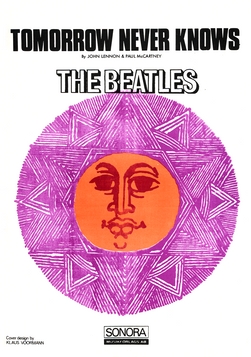Tomorrow Never Knows
The Beatles
Watch: New Singing Lesson Videos Can Make Anyone A Great Singer
Turn off your mind relax and float down stream It is not dying, it is not dying Lay down all thoughts, surrender to the void, It is shining, it is shining. Yet you may see the meaning of within It is being, it is being Love is all and love is everyone It is knowing, it is knowing And ignorance and hate mourn the dead It is believing, it is believing But listen to the colour of your dreams It is not leaving, it is not leaving So play the game "Existence" to the end Of the beginning, of the beginning
The easy, fast & fun way to learn how to sing: 30DaySinger.com
Written by: John Lennon, Paul McCartney
Lyrics © Sony/ATV Music Publishing LLC
Lyrics Licensed & Provided by LyricFind
14 facts about this song
SongwritingThe song was penned primarily by John Lennon, even though the credit goes down as Lennon-McCartney. Lennon took inspiration from Timothy Leary's, Richard Alpert's, and Ralph Metzner's book "The Psychedelic Experience: A Manual based on the Tibetan Book of the Dead".
|
Album Appearance"Tomorrow Never Knows" is the final track of The Beatles' 1966 studio album "Revolver."
|
Title OriginThe title came from one of Ringo Starr's many malapropisms, which were often labeled as 'Ringoisms'. Although the phrase was not specifically related to the song's lyrics or meaning, the Beatles liked it and decided to use it as a title.
|
Song CompositionKnown as one of the first songs to showcase the psychedelic rock genre, it features unusual musical techniques such as reverse guitar, processed vocals, and looped tape effects.
|
Technological InnovationsThe heavy use of tape loops in "Tomorrow Never Knows" essentially turned the recording studio into a musical instrument, which was an inventive approach at the time, praised for its innovation and creativity in sound design.
|
Paul McCartney's ContributionPaul McCartney was the one who introduced the band to tape loops, which became a significant feature of the song.
|
Vocal EffectsThe distinctive vocal effect on this song was created by running John Lennon's voice through a rotary speaker, generally used for an organ, to give it a direct, cutting sound.
|
Cultural Influence"Tomorrow Never Knows" was largely influenced by the burgeoning counterculture of the 1960s and Lennon's interest in psychedelic drugs like LSD.
|
Cover VersionsIt's been covered by other famous artists, including Phil Collins, The Mission, and The Monkees.
|
Appearance in Popular CultureThe song was used in a significant episode of Mad Men, where Don Draper listens to it in an attempt to understand youth culture.
|
Live PerformanceThe Beatles never performed "Tomorrow Never Knows" live, likely due to the complex studio manipulations used to create its unique sound.
|
Released SinglesThe song has not been released as a single.
|
Critical AcclaimIt is often cited as a groundbreaking track in terms of studio recording, and is considered a standout track on "Revolver," frequently cited as one of the best albums in popular music history.
|
Influence on MusicThis song played a key role in the evolution of ambient music because of its tape looping technique, which was considerably pioneering for the time.
|
Citation
Use the citation below to add these lyrics to your bibliography:
Style:MLAChicagoAPA
"Tomorrow Never Knows Lyrics." Lyrics.com. STANDS4 LLC, 2024. Web. 18 Apr. 2024. <https://www.lyrics.com/lyric/3176626/The+Beatles/Tomorrow+Never+Knows>.







Discuss the Tomorrow Never Knows Lyrics with the community:
Report Comment
We're doing our best to make sure our content is useful, accurate and safe.
If by any chance you spot an inappropriate comment while navigating through our website please use this form to let us know, and we'll take care of it shortly.
Attachment
You need to be logged in to favorite.
Log In